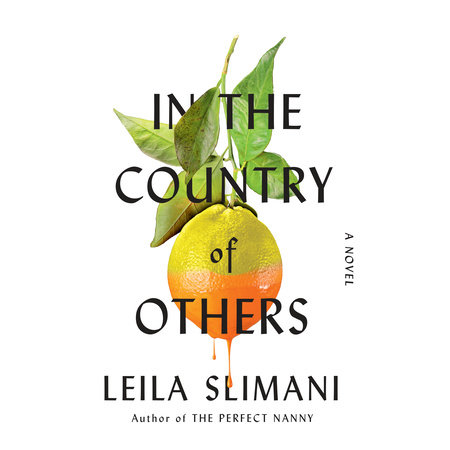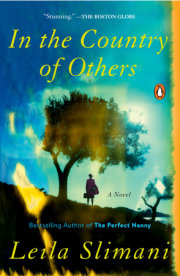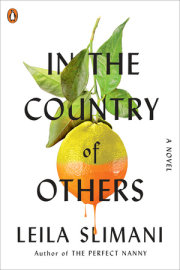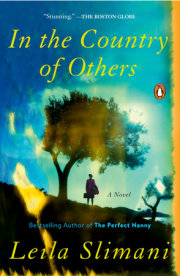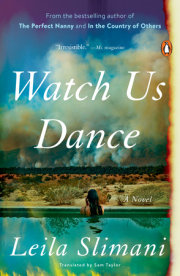The first time Mathilde visited the farm, she thought: It's too remote. The isolation made her anxious. He didn't have a car back then, in 1947, so they crossed the fifteen miles from Meknes on an old cart, driven by a gypsy. Amine paid no attention to the discomfort of the wooden bench, nor to the dust that made his wife cough. He had eyes only for the landscape. He was eager to reach the estate that his father had left him.
In 1935, after years spent working as a translator in the colonial army, Kadour Belhaj had purchased these hectares of stony ground. He'd told his son how he hoped to turn it into a flourishing farm that would feed generations of Belhaj children. Amine remembered his father's gaze, his unwavering voice as he described his plans for the farm. Acres of vines, he'd explained, and whole hectares given over to cereals. They would build a house on the sunniest part of the hill, surrounded by fruit trees. The driveway would be lined with almond trees. Kadour was proud that this land would one day belong to his son. "Our land!" He uttered these words not in the way of nationalists or colonists-in the name of moral principles or an ideal-but simply as a landowner who was happy to own land. Old Belhaj wanted to be buried here, he wanted his children to be buried here; he wanted this land to nurture him and to be his last resting place. But he died in 1939, while his son was training with the Spahi Regiment, proudly wearing the burnous and the sirwal. Before leaving for the front, Amine-the eldest son, and now the head of the family-rented the land to a Frenchman born in Algeria.
When Mathilde asked what he had died of, this father-in-law she'd never met, Amine touched his belly and silently nodded. Later, Mathilde found out what had happened. After returning from Verdun, Kadour Belhaj suffered with chronic stomach pains that no Moroccan healer or European doctor was able to allay. So this man, who boasted of his love of reason, his education, his talent for foreign languages, dragged himself, weighed down by shame and despair, to a basement occupied by a chouafa. The sorceress tried to convince him that he was bewitched, that some powerful enemy was responsible for his suffering. She handed him a sheet of paper folded in four, containing some saffron-yellow powder. That evening he drank the remedy, diluted in water, and he died a few hours later in terrible pain. The family didn't like to talk about it. They were ashamed of the father's naivety and of the circumstances of his death, for the venerable officer had emptied his bowels on the patio of the house, his white djellaba soaked with shit.
This day in April 1947, Amine smiled at Mathilde and told the driver to speed up. The gypsy rubbed his dirty bare feet together and whipped the mule even harder. Mathilde flinched. The man's violence toward the animal revolted her. He clicked his tongue-"Ra!"-and brought the lash down on the mule's skeletal rump. It was spring and Mathilde was two months pregnant. The fields were covered in marigolds, mallows, and starflowers. A cool breeze shook the sunflowers. On both sides of the road they saw the houses of French colonists, who had been here for twenty or thirty years and whose plantations stretched gently down to the horizon. Most of them had come from Algeria and the authorities had granted them the best and biggest plots of land. Reaching out with one hand while using the other as a visor to shield his eyes from the midday sun, Amine contemplated the vast expanse. Then he pointed to a line of cypresses that encircled the estate of Roger Mariani, who'd made his fortune as a winemaker and pig farmer. From the road they couldn't see the house, or even the acres of vines, but Mathilde had no difficulty imagining the wealth of this farmer, a wealth that filled her with hope for her own future. The serenely beautiful landscape reminded her of an engraving hung above the piano at her music teacher's house in Mulhouse. She remembered this man telling her: "It's in Tuscany, mademoiselle. Perhaps one day you will go to Italy."
The mule came to a halt and started eating the grass that grew by the side of the road. The animal had no intention of climbing the slope that faced them, strewn with large white stones. The driver stood up in a fury and began showering the mule with insults and lashes. Mathilde felt tears well behind her eyelids. Trying to hold them back, she pressed herself against her husband, who was irritated by her sensitivity.
"What's the matter with you?" Amine said.
"Tell him to stop hitting that poor mule."
Mathilde put her hand on the gypsy's shoulder and looked at him, like a child seeking to appease an angry parent. But the driver grew even more violent. He spat on the ground, raised his arm and said: "You want a good whipping too?"
The mood changed and so did the landscape. They came to the top of a shabby-looking hill. No flowers here, no cypresses, only a few stunted olive trees surviving amid the rocks and stones. The hill appeared hostile to life. We're not in Tuscany anymore, thought Mathilde. This was more like the Wild West. They got off the cart and walked to a small, charmless little building with a corrugated-iron roof. It wasn't a house, just a series of small, dark, damp rooms. There was only one window, located high up to prevent vermin getting in, and it let through the barest hint of daylight. On the walls, Mathilde noticed large greenish stains caused by the recent rains. The former tenant had lived alone; his wife had gone back to live in Nîmes after losing a child, and he'd never bothered making the house more attractive. It was not a family home. Despite the warmth of the air, Mathilde felt chilled. When Amine told her his plans she was filled with anxiety.
She had felt the same dismay when she first landed in Rabat, on March 1, 1946. Despite the desperately blue sky, despite the joy of seeing her husband again and the pride of having escaped her fate, she was afraid. It had taken her two days to get there. From Strasbourg to Paris, from Paris to Marseilles, then from Marseilles to Algiers, where she'd boarded an old Junkers and thought she was going to die. Sitting on a hard bench, among men with eyes wearied from years of war, she'd struggled not to scream. During the flight she wept, vomited, prayed. In her mouth she tasted the mingled flavors of bile and salt. She was sad, not so much at the idea of dying above Africa as at appearing on the dock to meet the love of her life in a wrinkled, vomit-stained dress. At last she landed, safe and sound, and Amine was there, more handsome than ever, under a sky so profoundly blue that it looked as though it had been washed in the sea. Her husband kissed her on both cheeks, aware of the other passengers watching him. He seized her right arm in a way that was simultaneously sensual and threatening. He seemed to want to control her.
They took a taxi and Mathilde was finally able to nestle close to Amine's body, to feel his desire, his hunger for her. "We're staying in the hotel tonight," he told the driver and, as if trying to defend his morality, added: "This is my wife. She just arrived." Rabat was a small city, white and solar, with an elegance that surprised Mathilde. She stared rapturously at the art deco facades of the buildings in the city center and pressed her nose to the glass to get a better view of the pretty women who walked along the Cours Lyautey wearing gloves that matched their hats and shoes. Everywhere she looked she saw building sites, with men in rags waiting outside to ask for work. She saw some nuns walking beside two peasants, who carried bundles of sticks on their backs. A little girl, her hair cut like a boy's, laughed as she rode a donkey led by a black man. For the first time in her life, Mathilde breathed the salty wind of the Atlantic. The light dimmed, it grew pink and velvet. She felt sleepy and she was just about to lean her head on her husband's shoulder when he announced that they'd arrived.
They didn't leave their room for two days. Mathilde, normally so curious about other people and the outside world, refused to open the shutters. She never wearied of Amine's hands, his mouth, the smell of his skin, which-she understood now-was somehow connected with the air of this land. She was completely bewitched by him and begged him to stay inside her for as long as possible, even when they were falling asleep or talking.
Mathilde's mother said it was suffering and shame that brought back to us the memory of our animal condition. But nobody had ever told her about this pleasure. During the war, all those nights of desolation and sadness, Mathilde had made herself come in the freezing bed in her upstairs room. She would run up there whenever the air-raid sirens wailed, whenever she heard the hum of an airplane, not for her survival but to quench her desire. Every time she was frightened, she went up to her bedroom. The door didn't lock, but she didn't care if anyone walked in on her. Besides, the others liked to gather in bunkers and basements; they wanted to die huddled together, like animals. She lay on her bed, and coming was the only way she could calm her fear, control it, gain some sort of power over the war. Lying on the dirty sheets, she thought about the men crossing plains all over the continent, armed with rifles, men who were missing women just like she was missing a man. And while she rubbed her clitoris she imagined the immensity of that unquenched desire, that hunger for love and possession that had seized the entire planet. The idea of this infinite lust plunged her into a state of ecstasy. She threw back her head and, eyes bulging, imagined legions of men running to her, taking her, thanking her. For her, fear and pleasure were all mixed up, and in moments of danger this was always her first thought.
After two days and two nights Amine almost had to drag her out of bed, half dead from hunger and thirst, before she would agree to eat lunch with him on the hotel terrace. Even there, her heart warmed by wine, she thought about how Amine would soon fill the space between her thighs. But her husband's expression was serious now. Eating with his hands, he devoured half a chicken and tried to talk about the future. He didn't go back up to the room with her and grew offended when she suggested that they take a nap. Several times he absented himself to make telephone calls. When she asked him who he was talking to or when they would leave Rabat and the hotel, his answers were vague. "Everything will be fine," he told her. "I'm going to arrange everything."
A week later, after an afternoon that Mathilde had spent alone, he returned to the room looking nervous and vexed. Mathilde covered him with caresses, she sat in his lap. He took a sip from the glass of beer she'd poured for him and said: "I have some bad news. We're going to have to wait a few months before we can move into our house. I spoke to the tenant and he refuses to leave the farm before the end of the lease. I tried to find us an apartment in Meknes, but there are still lots of refugees here and there's nothing to rent for a reasonable price."
Mathilde was bewildered. "So what will we do?"
"We'll live with my mother until it's ready."
Mathilde leaped to her feet and burst out laughing. "You're not serious?" She seemed to find the situation ridiculous, hilarious. How could a man like Amine-a man capable of possessing her as he had last night-how could he make her believe that they were going to live with his mother?
But Amine was not amused. He remained sitting, so he wouldn't have to suffer the indignity of the height difference between him and his wife, and in a cold voice, eyes fixed to the terrazzo floor, said simply: "That's how things are here."
She was to hear this phrase many times. It was at that precise instant that she understood she was a foreigner, a woman, a wife, a being at the mercy of others. Amine was on home soil here: he was the one who explained the rules, who decided the path they would follow, who traced the borders of modesty, shame, and decorum. In Alsace, during the war, he'd been a foreigner, a man passing through, and he'd had to be discreet. When she met him in the autumn of 1944, she had been his guide and protector. Amine's regiment was stationed in her village, a few miles from Mulhouse, and they'd had to wait there a few days before they received their orders to advance eastward. Of all the girls who surrounded the Jeep on the day of their arrival, Mathilde was the tallest. She had broad shoulders and muscular calves. Her eyes were as green as the water in the fountains of Meknes and they stared steadily at Amine. During the long week that he spent in the village, she went walking with him, introduced him to her friends, and taught him several card games. He was a head shorter than her and he had the darkest skin imaginable. He was so handsome that she was afraid someone would steal him away from her. Afraid that he was an illusion. She'd never felt anything like that before. Not with her piano teacher when she was fourteen. Not with her cousin Alain, who put his hand under her dress and stole cherries for her by the Rhine. But now she was here, in his homeland, she felt bereft.
Copyright © 2021 by Leila Slimani. All rights reserved. No part of this excerpt may be reproduced or reprinted without permission in writing from the publisher.

